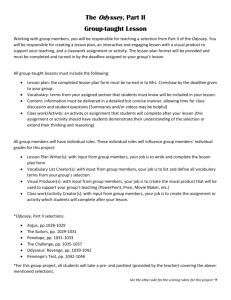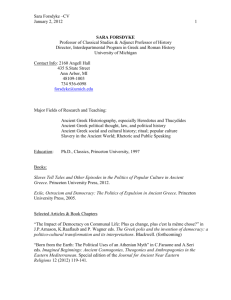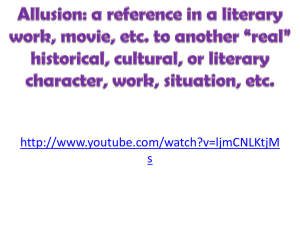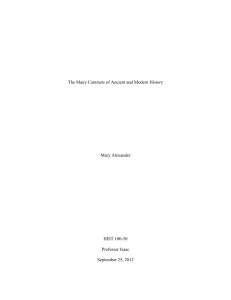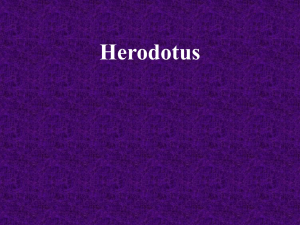Race in the Ancient Mediterranean
advertisement
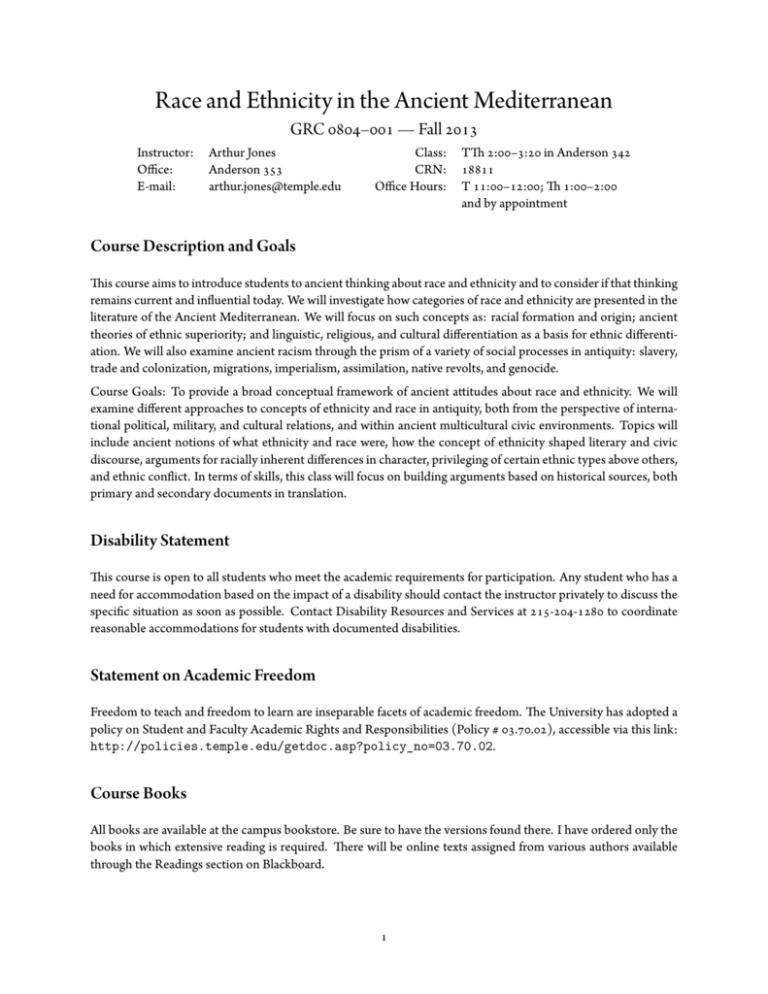
Race and Ethnicity in the Ancient Mediterranean GRC Instructor: Office: E-mail: Arthur Jones Anderson arthur.jones@temple.edu – Fall Class: CRN: Office Hours: T : – : in Anderson T : – : ; : – : and by appointment Course Description and Goals is course aims to introduce students to ancient thinking about race and ethnicity and to consider if that thinking remains current and in uential today. We will investigate how categories of race and ethnicity are presented in the literature of the Ancient Mediterranean. We will focus on such concepts as: racial formation and origin; ancient theories of ethnic superiority; and linguistic, religious, and cultural differentiation as a basis for ethnic differentiation. We will also examine ancient racism through the prism of a variety of social processes in antiquity: slavery, trade and colonization, migrations, imperialism, assimilation, native revolts, and genocide. Course Goals: To provide a broad conceptual framework of ancient a itudes about race and ethnicity. We will examine different approaches to concepts of ethnicity and race in antiquity, both from the perspective of international political, military, and cultural relations, and within ancient multicultural civic environments. Topics will include ancient notions of what ethnicity and race were, how the concept of ethnicity shaped literary and civic discourse, arguments for racially inherent differences in character, privileging of certain ethnic types above others, and ethnic con ict. In terms of skills, this class will focus on building arguments based on historical sources, both primary and secondary documents in translation. Disability Statement is course is open to all students who meet the academic requirements for participation. Any student who has a need for accommodation based on the impact of a disability should contact the instructor privately to discuss the speci c situation as soon as possible. Contact Disability Resources and Services at - to coordinate reasonable accommodations for students with documented disabilities. Statement on Academic Freedom Freedom to teach and freedom to learn are inseparable facets of academic freedom. e University has adopted a policy on Student and Faculty Academic Rights and Responsibilities (Policy . . ), accessible via this link: http://policies.temple.edu/getdoc.asp?policy_no=03.70.02. Course Books All books are available at the campus bookstore. Be sure to have the versions found there. I have ordered only the books in which extensive reading is required. ere will be online texts assigned from various authors available through the Readings section on Blackboard. Odyssey, Homer, Stanley Lombardo (translator). Hacke Publishing Company; ISBN: e Histories, Herodotus, Dewald, Water eld (translator). Oxford University Press; ISBN: e Gallic War, Julius Caesar, Carolyn Hammond (translator). Oxford University Press; ISBN: Agricola and Germany, Tacitus, Anthony Birley (translator). Oxford University Press; ISBN: As many of you may note, works by these ancient authors are freely available on the internet. You are free to use those versions instead of purchasing the above books. But be warned that the online versions mostly date from the early th century and show their age. You might also nd that it is difficult to follow along in class discussions or refer to the proper section (when writing a paper, for example). Policies and Procedures I expect you to keep up with the readings and be in class on time, ready to participate and ask questions. Keep a notebook for your readings and class discussions. I will be available for assistance during my office hours or by a scheduled appointment. I check email o en and should be able to get back to you within hours if you have an urgent question or concern. Most importantly, be respectful toward your fellow classmates. Food and Electronics You may have drinks, but please do not eat in class. Since many readings for this course will be PDFs, feel free to bring a laptop or other device to reference these PDFs in class. Note that readings PDFs on a phone-sized screen is not particularly convenient; you may prefer to have a print version available. Don’t let your computer/tablet/phone/etc become a distraction for you or others. A endance Policy A endance is mandatory. Class sessions will be a mix of lecture and discussion. e lectures will provide context to the material we will be reading. In discussions, we will explore the themes of race and ethnicity in the texts of many authors. If you do not a end, you cannot participate and will miss out on crucial contextual information. Participation/a endance is of your grade, so take it seriously. Absences Excused Absences due to accidents, medical emergency, or a death in the family, may be excused with appropriate documentation. A medical excuse must consist of an original (not copied,scanned, or faxed) le er on appropriate le erhead, signed and dated by your physician. If you have a medical issue that you know will require absences, e.g., surgery, tell me privately a er class or during office hours, no more than two weeks before the date. Policy on Religious Holidays: If you will be observing any religious holidays that will prevent you from a ending a regularly scheduled class, or interfere with ful lling any course requirement, you may have the opportunity to make up the course requirement only if you make arrangements by informing your instructor of the dates of your religious observance(s) within two weeks of the beginning of the semester (or three days before holidays that fall in the rst two weeks). Absences Unexcused You are allowed two ( ) unexcused absences per semester. Use them for problems due to car or SEPTA breakdowns (SEPTA strikes do not count as they are announced in advance). Each unexcused absence a er the second unexcused absence will result in a deduction from your participation grade. More than three ( ) weeks of unexcused absences ( absences total) may result in a failing grade, regardless of scores on papers, etc. Finally, if you must miss a class, get notes from a fellow student. Grades and Course Requirements List of Assignments: • Quizzes ( ) ( . each) • Odyssey/Herodotus Paper • Term Paper: Annotated Bibliography • Term Paper: Outline • Term Paper: Final Dra • Final Exam • Particiaption ree of the four quizzes will be given through Blackboard (exception is the Map Quiz). e papers and ancillary assignments will also be given through Blackboard. You can then submit your nished assignments through Blackboard, preferable to either email or hard copy. Assignments and quizzes (excluding the Map Quiz) are due at the end of the day (i.e. : pm) on the day listed below on the syllabus. Notes on the Calendar • Last day to drop a course: • Last day to withdraw: – – – – • Term Paper Due: • Final Exam: derson – – – – at : pm at : – : pm, An- N.B. Readings listed below use the book number within a particular volume and sometimes an additional section number, but never page numbers. Hence “Herodotus . – ” refers to Book of Herodotus’ Histories, sections through . Class Schedule Week Week : Week : Week : Date Aug. Aug. Sept. Feb. Sept. Feb Class Topic Introduction to Course Race, Racism, and Ethnicity Introduction to the Odyssey Hospitality and Colonization Pirates or Traders? Societal Divisions in the Odyssey Readings/Assignments PDF readings on Blackboard Odyssey Intro and Bks. – Odyssey – Odyssey – Odyssey – Week Week Date Sept. Class Topic Introduction to the Persian Wars Sept. Greeks Ethnicity Sept. Sept. Oct. Greeks and the Lydians Medes and Persians Persian Empire Oct. Egyptians Oct. Scythians Oct. Greek Racism? Week Oct. Library Resources; Athenian Empire and Citizenship Week Oct. Oct. Oct. “Natural” Slavery Introduction to the Roman World Roman, Greek, Carthaginian Oct. Romans, Gauls, and Germans Oct. Map Quiz; Romans and the Other in Italy Week Nov. Nov. Caesar in Gaul Caesar the Ethnographer Week Nov. Rome, from within and without Week Nov. Nov. Gauls in the Senate Romans in Britain Nov. Nov. Nov. Dec. Dec. Dec. Rome and Integration I Rome and Integration II anksgiving Break Re ections Study Day Week Week Week Week Week Week Week Final Exam: – : Readings/Assignments Odyssey Quiz; Herodotus Intro and . – Herodotus . – , – ; . – ; . Herodotus . – Herodotus . – ; . – Herodotus . – , – ; . – , – ; . – ; Behistun Inscription (PDF) Herodotus . – . [esp. . – , – , – , – ] Herodotus . – [esp. – , , – , – ] Herodotus Quiz; B. Shaw, “Eaters of Flesh, Drinkers of Milk” (PDF) Inscriptions (PDF) Herodotus/Odyssey paper due Aristotle, Politics (PDF) Plautus, Poenulus (focus on the Intro and Act ) Livy . – ; Polybius . – ; Plutarch, Marius – (Online) Term Paper: Annotated Bibliography due Livy . – ; CIL . . (PDFs) Caesar Books and Caesar Term Paper: Outline due Caesar Quiz; Augustus, Res Gestae; Aelius Aristides, To Rome (PDFs) Claudius and Tacitus (PDFs) Tacitus, Annals . – , . – (PDF) Tacitus, Agricola Term Paper: Final Version due pm, Anderson

